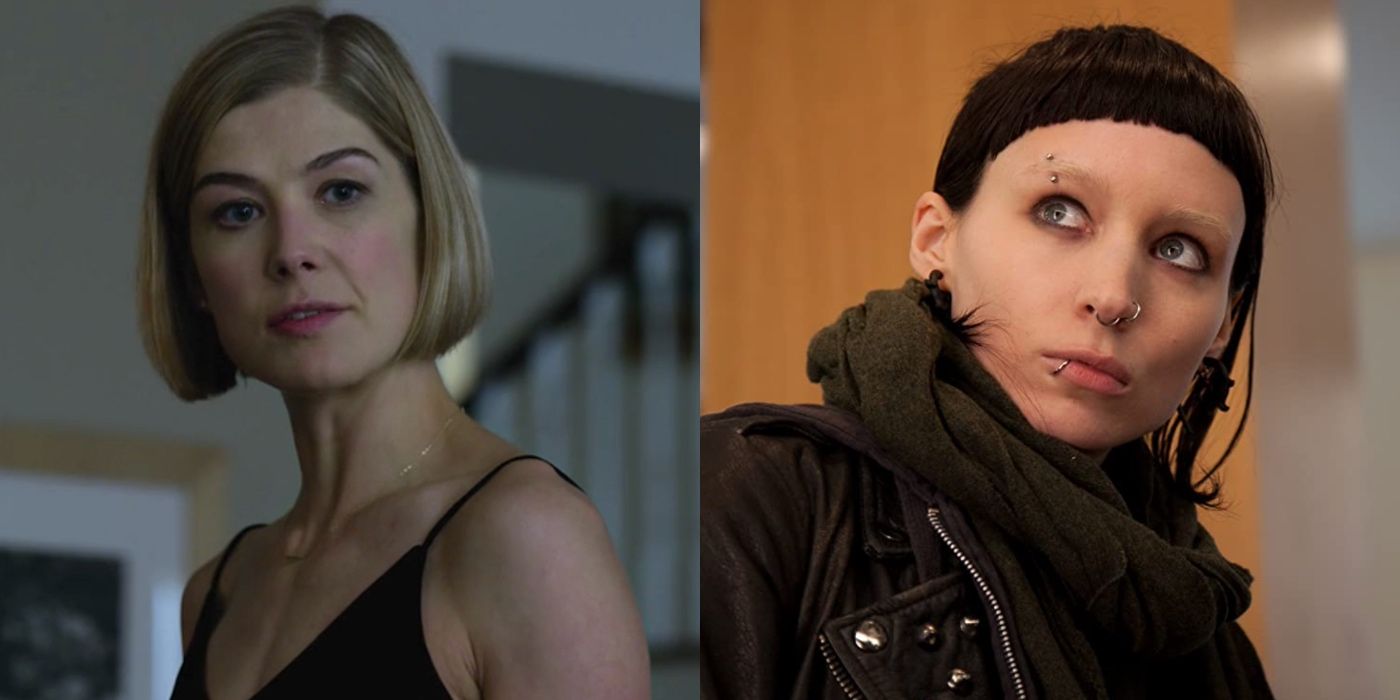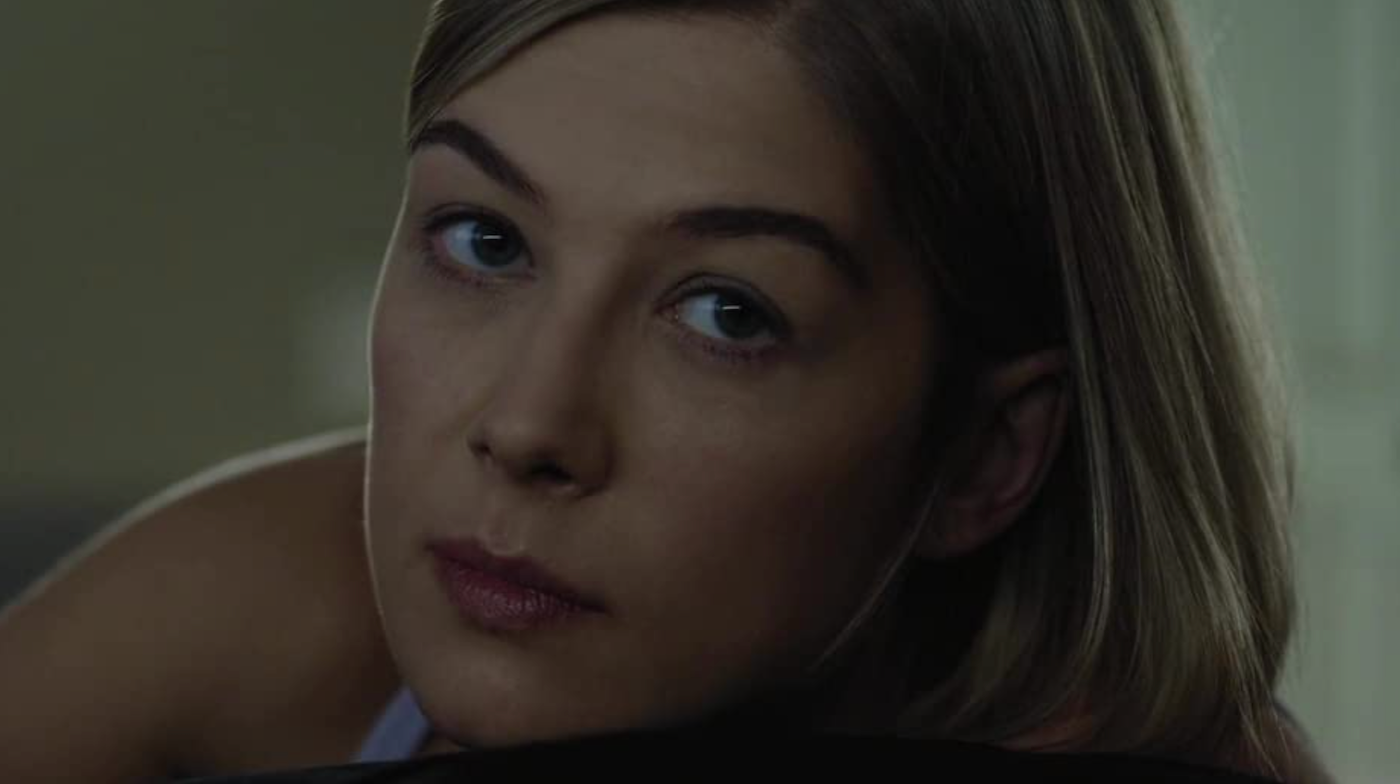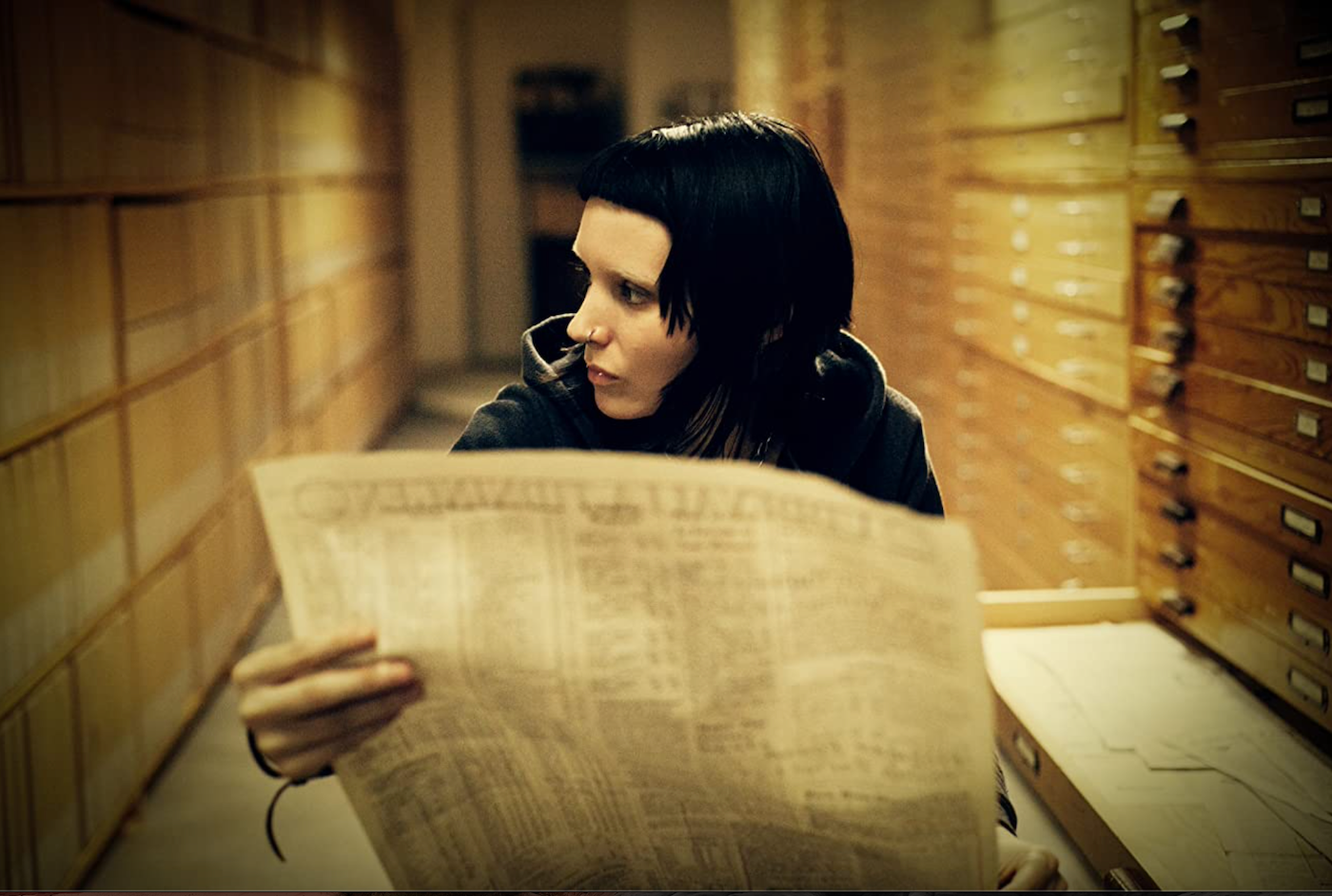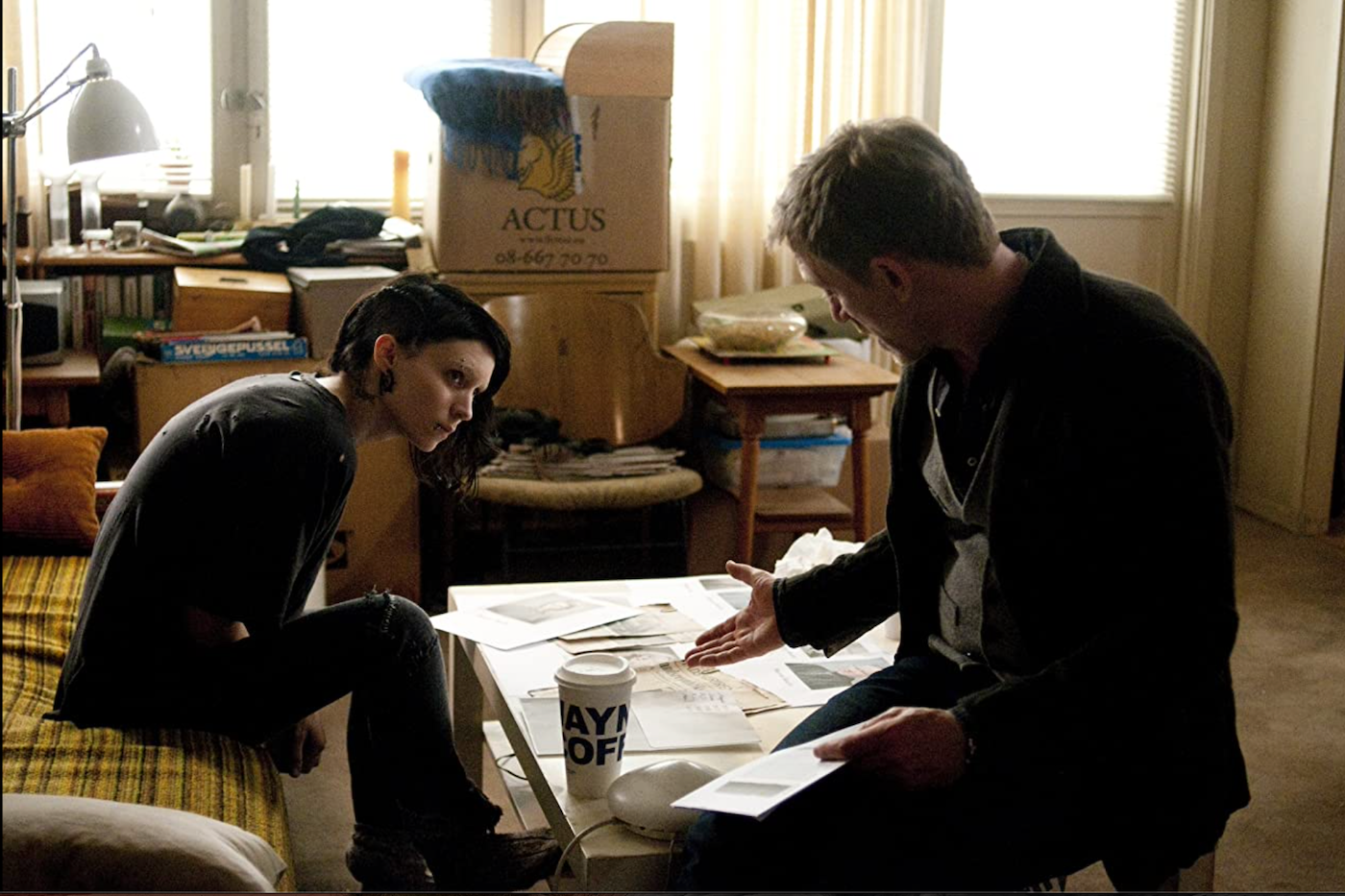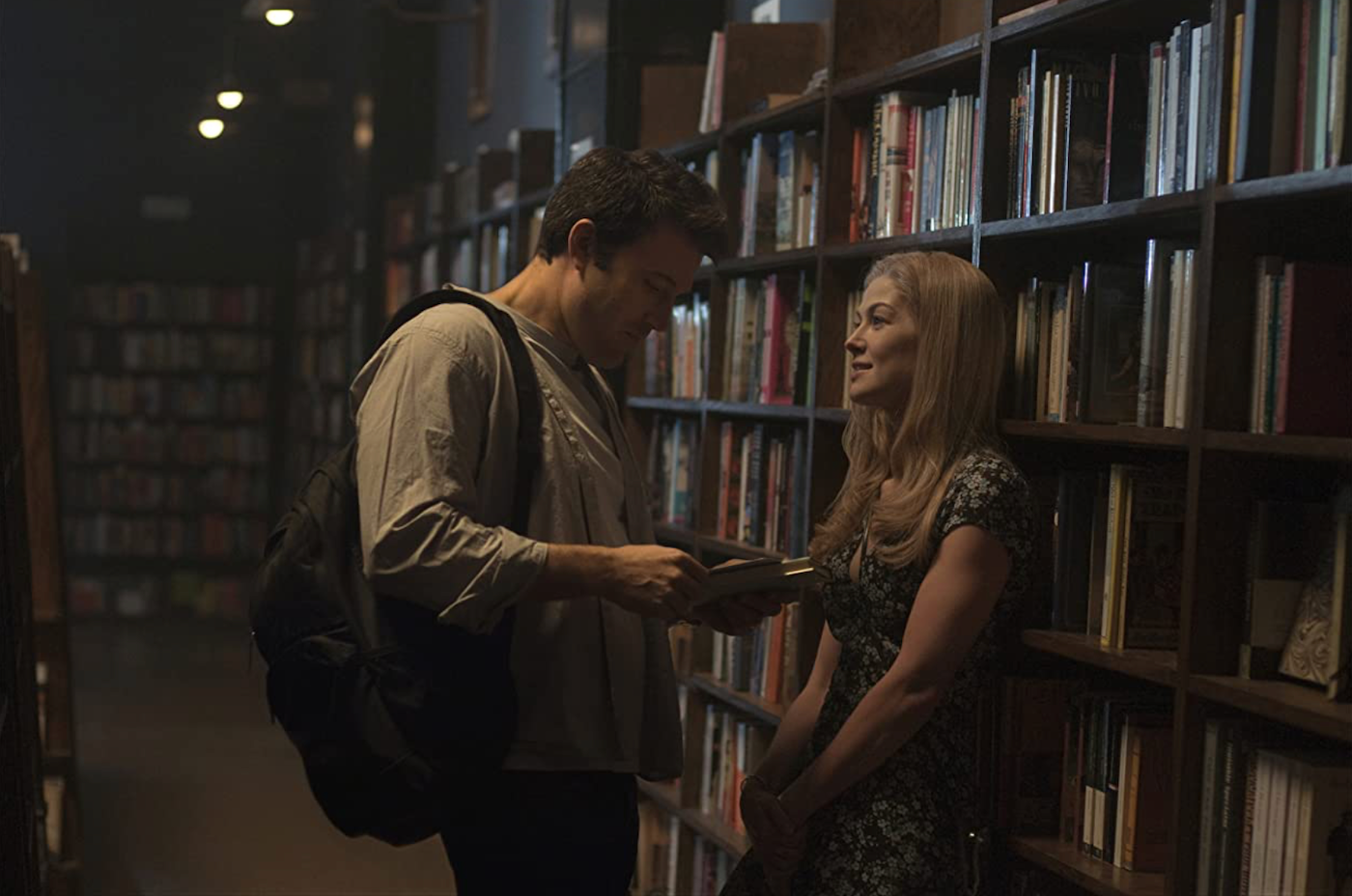In anticipation of the release of 'Mank' on December 4, this week Collider will be presenting original essays and features diving into the work of David Fincher.
There is nothing distinctly feminine about David Fincher's movies. The color palette is often a harsh mix of flat yellows, browns, blues, grays, and greens. The shadows loom large. The lights buzz with a fluorescent glare. The language is blunt and coarse. Fincher's infamous precision comes through in every scene. The characters are men who exist in male-dominated spaces: detectives at the police station, journalists in smoke-filled bullpens, businessmen in wood-paneled offices, working-class grunts in their rundown apartments, criminals communing in seedy meeting spots, fathers in their suburban homes, boyfriends on date nights gone wrong, nerds who become millionaire entrepreneurs with the click of a button. In a male world seen through a masculine perspective, what about the women?
It's not that Fincher's depiction of women is necessarily problematic. Rather, it's that the women in his movies have to bend to a man's world; this world often breaks them or, at minimum, leaves its mark on them. It is hard to imagine anything distinctly soft and feminine could flourish in a world of Fincher's precise crafting. (The great exception here is The Curious Case of Benjamin Button, the frequent outlier in Fincher discussions.) So, when Fincher does bring a woman to the forefront who breaks the world rather than let it break her, you should take notice.
To put it plainly: Fincher loves defiant women.
Fincher's attitude toward female characters has noticeably leveled up since he began directing movies in addition to music videos. In the early days, female characters were present and accounted for. Sigourney Weaver led 1992's Alien 3. Just three years later, Gwyneth Paltrow had a pivotal supporting role in Se7en. Fincher's third feature, Fight Club, sees Helena Bonham Carter gamely hang with Edward Norton and Brad Pitt (and on and on it goes). But the way in which women figure into Fincher's stories took a turn around Panic Room. Soon, the director began tackling more stories in which the interior lives of women were given more space for consideration and their arcs had some real impact on the story being told. By the time we get to the one-two punch of Fincher's page-to-screen adaptations of The Girl With the Dragon Tattoo and Gone Girl, we see female protagonists who are actively driving the story and manage to evolve on familiar archetypes utilized in two previous movies: Fight Club and Se7en.
The Girl With the Dragon Tattoo is a movie that uses a familiar crime/mystery framework — a Fincher favorite — to investigate the ways in which men thriving in the patriarchy seek to control women. Control takes many forms in this world, be it the Vanger family's control of Millennium magazine, Martin Vanger continuing his father's legacy of murdering women based on the book of Leviticus, or Lisbeth Salander's quietly lecherous lawyer controlling her through sexually predatory behavior. (To wit, the original Swedish title for The Girl With the Dragon Tattoo book is Män som hatar kvinnor, which translates to "Men who hate women.")
What stands out here is Lisbeth. She is, without a doubt, the next-gen analogue of Fight Club's Marla Singer (Bonham Carter). Lisbeth embodies Marla's "Fuck off" energy. Both women are drawn into darkness by the men they associate with and must carve out a space to claim as their own within it as a coping mechanism. Lisbeth is a cynic like Marla, too, whose latent trauma is masked by piercings, tattoos, and a mass of black clothing. Fincher indicates she is not someone to be ignored, even though everything about her radiates the energy of someone who does not want to be approached. As he told Empire magazine for a preview of Dragon Tattoo in November 2011:
"'She’s a superhero!' And you go, 'No, she’s not. Superheroes live in a world of good and evil, and she’s far more complex than a superhero. She’s been compromised. She’s been subjugated. She’s been marginalized. She’s been swept into the gutter and she’s had a part in it. She dresses like trash because she’s somebody who has been betrayed and hurt so badly, by forces beyond her control, that she’s just decided to be refuse."
It is the way in which Fincher works to show us more of Lisbeth to both humanize her and have her overcome her marginalization that we should latch onto. Because Fight Club is primarily concerned with male issues, we never get to see Marla's interior world. However, Dragon Tattoo is interested in women's issues as they relate to men, so Fincher takes time to show us who Lisbeth truly is. His camera lingers on moments where Lisbeth clenches her jaw or drops her gaze, absorbing the verbal or physical impact of the world around her. We watch her in her apartment, observing how she monitors the movements of men who would otherwise be monitoring her (a small reclamation of power). And even though we see Lisbeth's rape at the hands of her lawyer in excruciating detail, Fincher makes damn sure we take time to watch her methodically plan and exact her revenge on her rapist. This particular plot point in Lisbeth's arc may seem extraneous in a movie that spills over the two-hour mark. Yet it's necessary for Fincher as he builds a character arc that shows how Lisbeth's specific understanding of the dark hearts of men helps her plug into Mikael Blomkvist's (Daniel Craig) investigation of Harriet Vanger. Fincher may define Lisbeth primarily as a trauma-ridden person, but he's no longer concerned with confining her to that small space as he did with Marla. Instead, he used the Dragon Tattoo story to put more focus on Lisbeth's recovery and evolution out of that trauma through both the Vanger case and her relationship with Mikael.
Where Lisbeth's story is about pushing back at men out in the world, Gone Girl's Amy Dunne (Rosamund Pike) is interested in pushing back at the men inside the home. Similarly, if Lisbeth gets an early Fincher analogue, then Amy should get one, too. The answer is clear: Amy is an evolved version of Se7en's Tracy (Paltrow), wife of Brad Pitt's Detective Mills. Tracy's time onscreen in Se7en is relatively brief. Fincher uses this time to define her in relation to the men around her: Supportive wife, a sensitive confidant to Somerset (Morgan Freeman), and ultimately a woman questioning the harsh world around her since it flies in the face of the happier one she'd prefer to live in.
Where Tracy is concerned with upholding the idealized home, Amy is concerned with chipping away at it and exposing it for what it is: a sham. Amy has been put on a pedestal her entire life, first with her parents' "Amazing Amy" books and then in her marriage to Nick Dunne (Ben Affleck). She is privileged, white, blonde. In Tracy's case, whiteness and blondeness help telegraph innocence and vitality; for Amy, those assets are used by Fincher to show the cunning and coldness in her motivations. Fincher, who noted he was pro-Amy to Indiewire in 2014 ("There are parts of the movie where I go, oh yeah, 'Go Amy.' I love Amy") also managed to summarize what makes Amy's backlash against the dream of a happy home and marriage we're all raised on is so compelling to watch. As summarized by Indiewire at the time from a Film Independent Q&A, Fincher shared:
"I was most interested in the idea of narcissism as a way to hold two people together, and the notion that we project the best version of ourselves not only to seduce somebody that we imagine to be perfect for us but also perfect for our narcissistic rejection. Then three years down the line the other person in the contract says, ‘I can’t get it up for this anymore. I can’t be your soulmate. I was never that person and I am done.’ And I love the wrath that [it] inspired."
Amy's amusingly perverse plan to frame her husband for her murder — as well as the advanced stages of manipulating her ex before killing him and planning a pregnancy to save her marriage — works to upend any expectations we have of what a wife and mother should be. Here, Fincher twists the domestic thriller genre to fit his artistic vision, turning Amy into a different kind of homewrecker. This is a woman who has been hemmed in by the expectations of others for so long that when she finally catches her husband cheating on her, she puts new meaning into "Hell hath no fury like a woman scorned."
Amy's plan is precise and exacting. The calendar Amy works up to plan for every stage of her revenge is a masterstroke. The sequence where we listen as she details the months-long phases of this carefully-constructed plan could double for Fincher laying out his vision for us. Even the device of Amy's journals as juicy tell-alls is Se7en-esque and very effective in Fincher showing us just how detail-oriented Amy is. It's no wonder Fincher loves Amy so much; it's clear he identifies with her. She is a woman attuned to a specific kind of maleness and gifted with a keen sense of manipulating it for her own expositional purposes, much like Fincher in his films.
Perhaps the most intriguing aspect of Lisbeth and Amy's respective places in Fincher's world is that they move in genres he is fluent in. Crime and punishment are two of Fincher's passions, a strong through-line in his body of work. Crime and punishment also stir up particularly masculine, cold imagery: when we see women who've adapted in these worlds, much like when we see female leads in a Fincher movie, we take notice. Lisbeth and Amy represent new, evolved avatars through which Fincher can speak as a director. Where women in his previous films seemed like objects he was studying with his camera, Lisbeth and Amy are women he appears comfortable spending time with onscreen, using them as eyes through which to view the world. Lisbeth and Amy's careful, pointed defiance seems to fascinate him. So, even though the look and feel of Fincher's movie worlds haven't strayed too far from the path over the years, it seems he's found a way to expand them and, in doing so, invite women into them as well.
For more from Collider's Fincher Week, be sure to check out Senior TV Editor Liz Shannon Miller on Fincher's lasting impact on TV with House of Cards. And before you go, why not check out our ranking of Fincher's movies?

